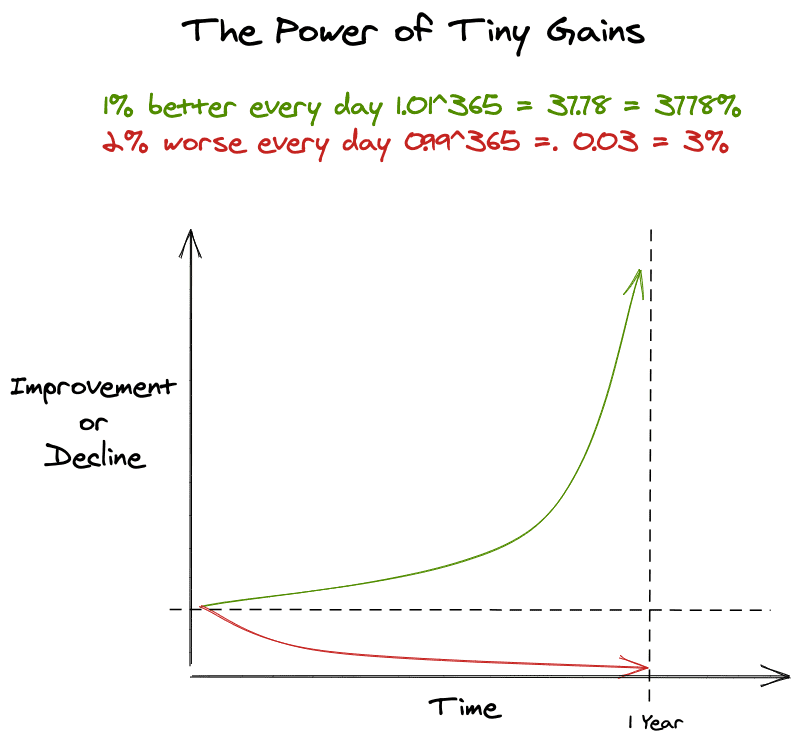Be better than yesterday
03 October, 2020 - 5 min read
The idea is to not become stagnant, or dormant; to always strive for growth. It's a realization that there is always ways to improve in every aspect of life - your career, health, hobbies, relationships, and more. The problem is finding it and finding the solution, but it's okay; you can start by being more mindful of these things. Think of life as a system consisting of smaller processes, if you find a process is slow; take note of it and think of ways to improve - then experiment
Continuous improvement
"Continuous improvement is a dedication to making small changes and improvements every day, with the expectation that those small improvements will add up to something significant. - James Clear"
The idea is to be consistent, view it as a long term investment; you will reap the benefits in the long term, not the short term. The problem is we live in a state of society where everyone has very little patience; a result of instant feedback. We now live in a world where we are spoiled, we expect things to happen right away.
- We expect instant feedback on anything placed onto social media within the minute
- We expect food delivered to our doorstep within the hour
- We expect our amazon packages to come within the next day
- We expect instant feedback
So a typical approach to self improvement is the setting of large ambitious goals and taking big steps towards that goal, and expecting instant results. While often sounding promising, it often will lead to burnout, frustration, and failure. Instead, we should focus on long term consistency.
The power of tiny gains
I think the easiest way to start ideating solutions, is to try and find a way to quantify the problem. James' Clear's idea of "Tiny Gains," is probably one of my favorite theories when it comes to self improvement through consistency.
"If you get one percent better each day for one year, you'll end up thirty-seven times better by the time you’re done. - James Clear"
The idea is that if we improve 1% each day for 365 days, we'll be 37.78 times or 3778% of our initial state at day 1. And if we get 1% worse each day for 365 days, we'll be 0.03 times or 3% of our initial state at day 1. Another interesting point is since it is an exponential rate of increase, at 730 days of 1% improvements, we'd be at 730 times or 73,000% of our initial state at day 1.
Of course this is just a theorem, and it is not easy to quantify improvements and find exactly what percent we improved. But the idea is to be conscious that these "gains" and "losses" are happening as we speak and that if not kept in check - we can easily become stagnant or worse.
Some solutions!
Now that we have defined the problem (that we need to grow consistently) and we have attempted to quantify that problem (tiny gains). Let's rephrase that problem, and come up with some solutions.
Problem
How to stay consistent, because let's be real → easier said then done.
Solution #1: Do more of what already works
Think of your current habits, maybe list them and try to think of how they work. If you don't have any; it's okay, because once you build your first one; you can use the same steps to build another one. For myself this is my list:
-
Consistent running: I was able to consistently run 40 km a month for 5 months.
- Accountability: My friends put me in a monthly challenge group
- Constraints: I told myself I couldn't shower unless I went for a run
- Motivation: I made the runs enjoyable by listening to audiobooks
- Consistency: I properly paced myself
-
Consistent flossing: I incorporated flossing into my routine.
- Start small: Once a week, then twice a week, now I'm at about every 3 days
- Made it easy: I changed my setup so that I was closer to the mirror when flossing
- Educate yourself on the benefits: Not flossing = Undisturbed plaque = Tooth decay = Teeth falling out
Solution #2: Improvement by subtraction
Getting better, doesn't have to be about doing the right thing - it can be about doing less of the wrong things. It can mean focusing on what doesn't work and eliminating those things, and trying something different.
It can also mean eliminating things that don't contribute to your improvement to free up some resources to maintain consistency in the things that do contribute to your improvement. If it's something that's neither a good or bad thing, it's probably a bad thing.
Solution #3: Measure backwards
"You can't connect the dots looking forward, you can only connect them looking backwards. - Steve Jobs"
Make decision's based on what has happened, build off your experiences not your goals. Instead of thinking of next week and how you're going to improve, think of last week - what worked and what didn't work.
Solution #4: Have fun
Try to make what you're doing fun, it's easier to stay consistent when you're having fun. You can try:
- Doing it with friends
- Give yourself some incentive with fun rewards
- See if you can re-orient your perspective on what you're doing and relate it to something fun
Solution #5: Give yourself a reason
If you can't find a reason to improve, maybe you need to re-evaluate your core beliefs. I know for myself I lacked in certain areas of essential skills, specifically: psychology. I think the first thing everyone needs to define for themselves is:
- Purpose
The trick lies in first defining what it means to you, a general definition. Then the hard part comes after that, the lifelong journey of going about fulfilling that definition.

